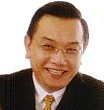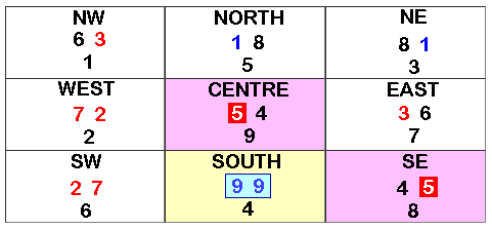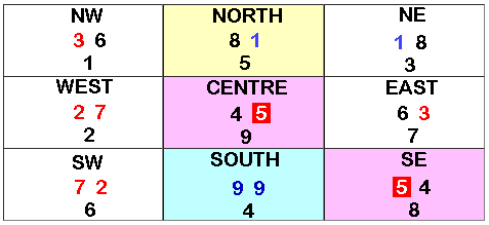-
Posts
38394 -
Joined
-
Last visited
-
Days Won
144
Content Type
Profiles
Forums
Blogs
Events
Gallery
Store
Articles
Everything posted by Cecil Lee
-
Dear Fraser, 1. There is a difference between a Strong metal and weak metal person. For a strong metal person, your company logo can have wood in it. For a weak metal person, you may need earth to strength metal inorder to destroy wood to create wealth. 2. Usually, this applies to logos and less to company name. Assuming that you are a weak metal person, perhaps, your company name should do more with `earth' to strenghten metal instead of using wood. Warmest Regards, Cecil
-
Dear Aping, 1. Where possible, it is (if you can) employ the services of a Feng Shui practitioner. This is because, there are lots of issues involved in building a good house. In general:- 1. Shapes and Form, 1.1 The frontage of the house and back of the house are important considerations. The frontage need not necessary be the location of the front door. The front door can still be at the side of the house e.g. a drive thru car porch. 1.2 The front door Where possible, the front door should suit the breadwinner and under the Eight House, should preferably not be at the death/disaster sector. The other consideration is if one can, build a house which takes advantage of the auspicious directions or birth chart of the house. I have actually given examples where, we were looking for not only good houses but `excellent' houses, we searched first for houses that have the Double 7's (under Flying star). There is a program available under www.geomancy-online.com where we used it for ourselves to find a good door facing. (Based on Flying Star) 1.3 After this, we then look at the house based on Shapes and Form and Eight House. 1.4 Equally important is knowing each of your element and strength (Pillars of Destiny). Once all the above, are known, we usually, use all these tools to then do a comprehensive analysis of the house. Thus proper Feng Shui is not based on bits and pieces of unrelated information as what you have mentioned below. Hope the above helps. Warmest Regards, Cecil
-
Dear Niki, 1. You can checked out the Chinese Astrology page at http://www.lovesigns.net The above link has information about your animal sign, its characteristics and compatibility with others. 2. Under Feng Shui, my advise is to take your time to digest the various `Schools' of Feng Shui such as: - The Shapes and Form School - The Compass Schools You can either purchase the `tons' of books available on Shapes and Forms or browse thru the Resource pages of this website and the forum. My advise is to take your time to find out more what Feng Shui can and cannot do and the limitations of each `School'. Warmest Regards, Cecil
-
Dear Cheui May, We are glad to hear of it:) Warmest Regards, Cecil
-
Dear Cheui May, 1. For the house, we have already gone thru the various `cures' to balance the specific sectors. 2. For the individual, you can add `metal' during this period. For Example, you can wear white, `gold' coloured dresses (or T shirts) to further enhance your water element. You can equally, use blue, black or shades of grey also. The above is not compulsory, but would help. 3. Overall, you should not be too concerned about your bedroom being west. The above should do. Warmest Regards, Cecil
-
Dear Jan, 1. Generally, if one is undecided which is color to choose, use a neutral color like white colour. This serves another `purpose' ie to make the exterior `Yang' as opposed to `yin' dark. 2. Other `light' colors are generally acceptable. 3. More importantly, the roof tiles should not be in blue color as this represent water and may suggest `difficulty' for the household. Warmest Regards, Cecil
-
Dear Anon, I believe these are `modern' books. We are aware that charcoal can be used to neutralise odour e.g. in a fridge. Perhaps, those who recommended using coal is on the same concept e.g. to `absorb'... something... Warmest Regards, Cecil
-
Dear Anon, One popular Feng Shui principle is "If you cannot see it, it no longer is a threat". For a cure, `if a cure is not displayed it, it no longer works". Hope the above helps:) Warmest Regards, Cecil Lee (c) 2000
-
Here are the pictures for a better understanding of the article:- One side of the Singapore $1 coin showing a Ba Gua profile (both sides have the Ba Gua profile):- Singapore Island Map with rough locations of Tanjong Pagar and Marine Parade:- Singapore Road Tax Licence Disk displayed on every car windows:-
-
Dear Anon, Thanks for your comments. Whenever, I personally detect a `tone' in writing of someone wanting `Instant Feng Shui' as in "instant coffee", or fast food Feng Shui. I mentioned to contact a Feng Shui practitioner in the hope of `bringing' some reality i.e. it is difficult to do a proper Feng Shui if one is new. Thus ideally, in such situations, best to go get a Feng Shui practitioner (competent one). By giving the above example, my hope is that if one practises Feng Shui, I have mentioned thus to go slow. As the common saying goes, a little knowledge is a dangerous thing. Warmest Regards, Cecil
-
Dear Carrie, 1. Double 7s is ideal if it is your main entrance door but not other doors. 2. Water positions are usually activated in the living room or outside the frontage of the house. 3. Have you confirmed that there is indeed a water or mountain star. As these cannot suddenly `popup' from any sector. They have to be identified and at the sector. 4. Even if there is a water star, you may not be able to activate it in the kitchen. Please refer to above Para 2 for the best locations to activate a water position. Remember that in a kitchen, one is playing with fire and it does not make `sense' to activate a water position in a kitchen. It can be dangerous to play with `water' here. 5. The best water position to activate a water position is a fountain. But here, if one wants to do so, please do not pose another question as: Should I turn it on 24 hours? (My personal thoughts) My question is, if it is not on, it is `broken'. So, if one must buy, buy it. If one wants to increase their electricitly bill, in the hope of getting `returns', prepare to pay and pay... If no results, (because, it is too small, then... don't ask me why it don't work). 6. I have mentioned in a few recent messages that if one is fortunate to stay in e.g. a condominum, and if it so happens to have a fountain e.g. at the proper location, this would outweigh the benefits of having a fountain in the home. If the fountain inside the house measures e.g. 2 feet, imagine how much beneficial Qi it can generate? 7. The mountain star can still be activated in the kitchen especially if there is a back door. Warmest Regards, Cecil
-
Dear Anon, 1. If you are using the Eight House Theory, you should also look at what is the influence in your bedroom. 2. Normally, we look at the Flying Star of the house particulary, the Main entrance door and the second door to see if these are auspicious. For example, if your house is constructed within 1984 to-date, and if there happens to be a Double 7s (this may sound technical) it implies that this door at NW sector is auspicious for the main door. So one should continue to use it. 3. If you do not want to use the Flying Star, then, I still feel that as you mentioned that SE door is not convenient, you should not use this door. For the main door, at NW, you should keep the location bright and close the door when not in use. Warmest Regards, Cecil
-
Dear Linda, At locations like the NE (Devil's gate) and SW (Devil's backdoor), it should not be a concern unless: 1. The location becomes too YIN. For example, one grows a large tree. A large tree creates shade and makes that area too Yin. 2. In such a situation, it increases the YIN and more likely, prone to effects of `evil influences'. 3. One can also use the Flying Star chart to check on how much Yin influence is in a particular room such as the North East. If there is too much yin elements plus it is contributed by Para 1, then more cause for concern. 4. I believe, by asking some of these questions, you are `new' to Feng Shui and Chinese Divinity methods. My advise, is not to go hastily into the use of Feng Shui. Unless one is in a real hurry for changes, then it would be best to consult a competent practitioner for a `worry' free audit. 5. Overall, when you mentioned that in `your case, the NE is good, you are using only one of the tools of Feng Shui i.e. the Eight House Theory. 6. When you mentioned that your main door is facing a neighor's tree, is it directly slicing your main door? There are other methods available that can be used instead of using a Ba Gua mirror. This include placing two plots of plants on both sides of the Main entrance door. Warmest Regards, Cecil
-
Dear Anon, 1. You brought up an interesting question. 2. Honestly, at present I really do not have the answer. This is because, there are very few houses I personally come across with a bedroom at the centre location of the house. Usually, this would either be clear space, the staircase area or the hallway and even toilet locations. More commonly part of the living or dinning area. 3. Another reason is because bedroom suppose to be private area i.e. four walls and windows /door and I cannot imagine a bedroom at the centre and yet, have windows surrounding at least one side. 4. Assuming that you sleep at the centre room, then it is difficult to apply the Eight House concept. 5. One can still apply the Flying Star concept. I believe a house must be reasonably `large' to accomodate a centre room. It would be interesting to see your layout plan:) Warmest Regards, Cecil
-
Dear Linda, 1. Firstly, Congratulations! 2. If you are in Singapore, or any in the region, it is common to go to any of the temples to get `blessed'. If you are not sure which temple, you can visit more `netural' temples such as the Goddess of Mercy Temple (Quan Yin) at Waterloo street. 3. Items like Buddhas and other religious objects are not Feng Shui so, I do not subscribe to users buying them for such purposes. As it has more to do with religion. And inviting idols etc.. would imply that one may have to pray to these. So this is up to the individual and their faith. 4. More importantly the main considerations are: (In most traditional practises) a. Choosing an auspicious date to move in. b. Bring in the following first: charcoal wrapped in red paper i.e. to signify `goal' bring in small a red stove bring in a bin filled with rice etc... The above varies with individual traditions and practises. Warmest Regards, Cecil
-
Dear Anon, If one is not sure, please use the Pie chart method. It is similar to the Eight House `angle' of influence concept: If you can draw a simple diagram to illustrate what you mean, as I am not too clear what u actually mean:) Warmest Regards, Cecil
-
Dear Anon, 1. A mountain star should not be activated in the centre of a room. A certain of a room should have clear space. 2. A mountain star cannot apply as and when we want it to. It has to be `found' and if there is a mountain star applied under certain conditions such as: - A backdoor or in a room. 3. No a ceiling fan (moving blades) even with a external decorative cover at the middle (with the magnetic coils) at the centre cannot be considered a mountain star. Warmest Regards, Cecil
-
Dear Anon, Under symbolism, a `live' crab shape is auspicious because, it is alive i.e. vibrant and active. While a dead crab (fried or steamed) ie. turned Red, is already dead or no more `activity.' Warmest Regards, Cecil
-
I happen to come across this article `interesting' as it touch on Shapes and Form Feng Shui about Singapore:- At times, I found this article to be quite `humours':) Please note that this site is `opposed' to the present leadership in Singapore. I am not sure, if some of the information is totally reliable. Caution aside, please read on... http://www.gn.apc.org/sfd/Link%20Pages/Link%20Folders/Other/fengshui.html Source: Written by Jonathan Tan for SFD. Jonathan is average height and has black hair and dark brown eyes. He's a second-year student at NUS. Jonathan is his pen-name of course.} Warmest Regards, Cecil
-
Contrary to the notion that a house / office or shop are `bad'... In my opinion, this type of house / office / shop at a `T-junction' (under Shapes and Form) may not necessary have bad Feng Shui if there is a one lane traffic flowing away from the frontage of the house. Please see below:- We should still remember to do an audit to ensure that the main entrance door is `protected' from other poison arrows e.g. sharp edge of another building etc... Warmest Regards, Cecil
-
Dear Anon, In my opinion, one should classify this under a `belief' rather than Feng Shui. (Thus one must be clear between the distinction of Feng Shui and `beliefs'.) Since it is a belief, it is up to the individual to `belief' it can (or cannot) work for the person. To me, there is no harm to place three coins in the account book if one reallys wants to. If I were to say that one must use a gold gilt edge accounts book, do you want to belief what I say. Again, this is a belief as it cannot relate to the five elements. Perhaps, with all the `glitter', when one opens that page, it makes the specific area `bright'. Again, each of us, can only decide for ones-self:) Warmest Regards, Cecil
-
Dear Anon, Yes, N1 and S1 charts are nearly identical. With the exception that their Water & Mountain Stars are flipped as shown here:- N1 PERIOD 9 CHART For example North is 8 1 S1 PERIOD 9 CHART While S1, North is flipped as 1 8 instead This is simply the nature of Flying Star charts. Thus a N2 and S2 will share similar traits etc.... Warmest Regards, Cecil
-
Dear Carrie, 1. On this site, the interpretation is inside my course materials on Flying Star, but currently as I mentioned in a few postings that, I prefer to work on it further as I am not fully satisfied with the course materials. 2. Currently, the Flying Star Report available under www.geomancy-online.com fully meets the requirements and is exhaustive in analysing all three components: Water, Mountain and Base stars for each sector. And giving advise when needed for imbalances within each sector and also providing advise on the element required. 3. So far, I have only seen others who only manage to just generate the charts but lack fully in the above analysis. 4. There is one book, Lillian Too's Chinese Numerology. In my opinion, there are some errors and majority of the time, these are again charts `generated' but lacking in analysis. On our end, we have already done away with manual analysis, thus freeing our time to concentrate on the `finer' details i.e. to provide further assistance and interpretation. I am not going to interpret manually what 653 is etc... or resulting in whether there is a balance or not. I feel such time, should be spent more productively at my end. Warmest Regards, Cecil
Forecast
Free Reports
Useful Handbooks Guides
Feng Shui
- Feng Shui Resources
- Fun with Feng Shui
- Photo & Pictures
- Encylopedia of Feng Shui
- Singapore Property Review
Chinese Horoscope
Palmistry
Feng Shui Consultation
Services
Order & Download Forms
Main Navigation
Search





